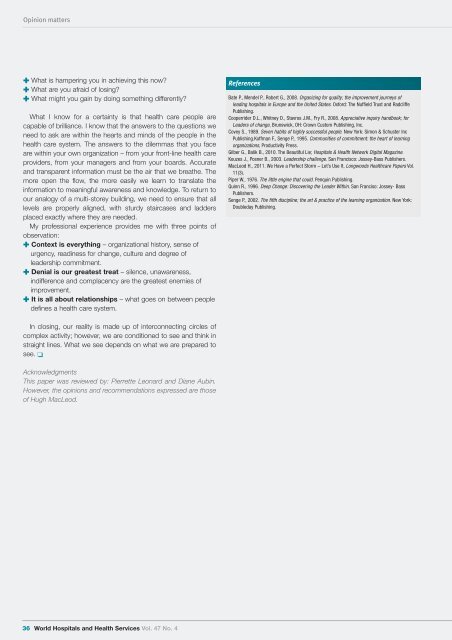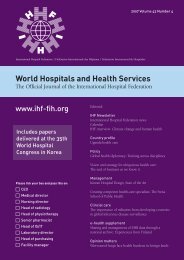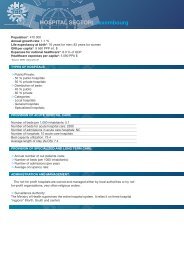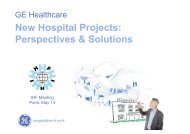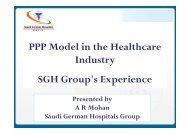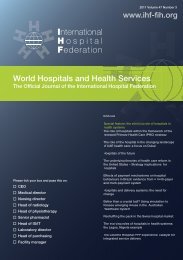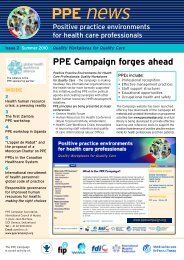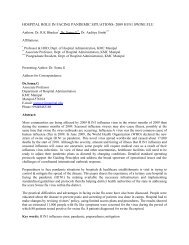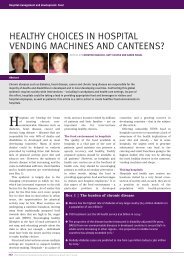web_vol47 4.pdf - International Hospital Federation
web_vol47 4.pdf - International Hospital Federation
web_vol47 4.pdf - International Hospital Federation
You also want an ePaper? Increase the reach of your titles
YUMPU automatically turns print PDFs into web optimized ePapers that Google loves.
Opinion matters<br />
✚ What is hampering you in achieving this now?<br />
✚ What are you afraid of losing?<br />
✚ What might you gain by doing something differently?<br />
What I know for a certainty is that health care people are<br />
capable of brilliance. I know that the answers to the questions we<br />
need to ask are within the hearts and minds of the people in the<br />
health care system. The answers to the dilemmas that you face<br />
are within your own organization – from your front-line health care<br />
providers, from your managers and from your boards. Accurate<br />
and transparent information must be the air that we breathe. The<br />
more open the flow, the more easily we learn to translate the<br />
information to meaningful awareness and knowledge. To return to<br />
our analogy of a multi-storey building, we need to ensure that all<br />
levels are properly aligned, with sturdy staircases and ladders<br />
placed exactly where they are needed.<br />
My professional experience provides me with three points of<br />
observation:<br />
✚ Context is everything – organizational history, sense of<br />
urgency, readiness for change, culture and degree of<br />
leadership commitment.<br />
✚ Denial is our greatest treat – silence, unawareness,<br />
indifference and complacency are the greatest enemies of<br />
improvement.<br />
✚ It is all about relationships – what goes on between people<br />
defines a health care system.<br />
References<br />
Bate P., Mendel P., Robert G., 2008. Organizing for quality; the improvement journeys of<br />
leading hospitals in Europe and the United States. Oxford: The Nuffield Trust and Radcliffe<br />
Publishing.<br />
Cooperrider D.L., Whitney D., Stavros J.M., Fry R., 2008. Appreciative inquiry handbook; for<br />
Leaders of change, Brunswick, OH: Crown Custom Publishing, Inc.<br />
Covey S., 1989. Seven habits of highly successful people. New York: Simon & Schuster Inc<br />
Publishing.Koffman F., Senge P., 1995. Communities of commitment: the heart of learning<br />
organizations, Productivity Press.<br />
Gilber G., Balik B., 2010. The Beautiful Lie; <strong>Hospital</strong>s & Health Network Digital Magazine.<br />
Kouzes J., Posner B., 2003. Leadership challenge. San Francisco: Jossey-Bass Publishers.<br />
MacLeod H., 2011. We Have a Perfect Storm – Let’s Use It, Longwoods Healthcare Papers Vol.<br />
11(3).<br />
Piper W., 1976. The little engine that could. Penquin Publishing.<br />
Quinn R., 1996. Deep Change: Discovering the Leader Within. San Franciso: Jossey- Bass<br />
Publishers.<br />
Senge P., 2002. The fifth discipline; the art & practice of the learning organization. New York:<br />
Doubleday Publishing.<br />
In closing, our reality is made up of interconnecting circles of<br />
complex activity; however, we are conditioned to see and think in<br />
straight lines. What we see depends on what we are prepared to<br />
see. ❏<br />
Acknowledgments<br />
This paper was reviewed by: Pierrette Leonard and Diane Aubin.<br />
However, the opinions and recommendations expressed are those<br />
of Hugh MacLeod.<br />
36 World <strong>Hospital</strong>s and Health Services Vol. 47 No. 4


